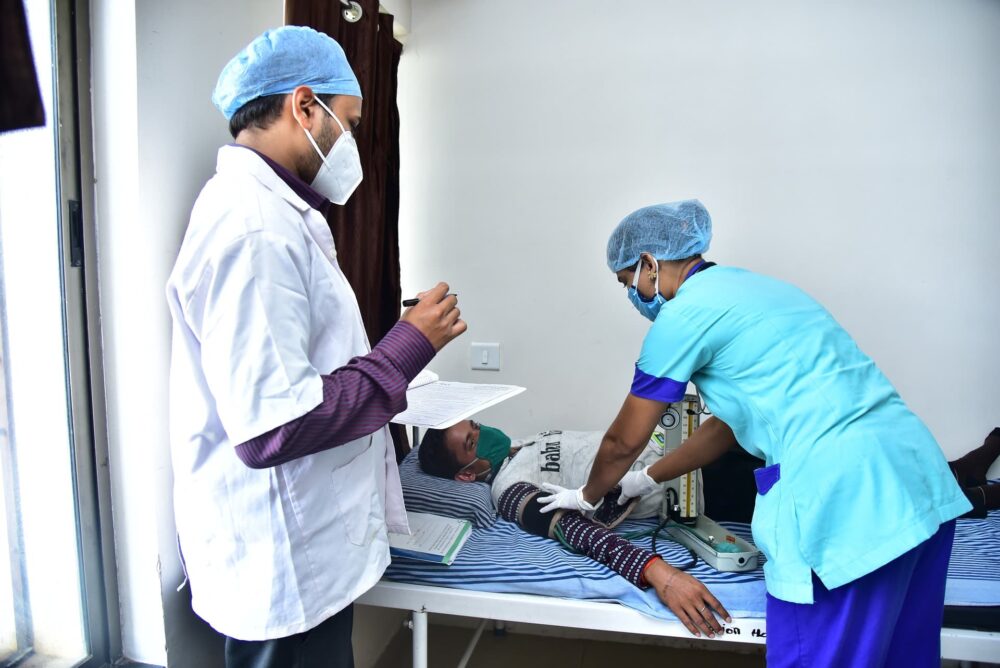India has a universal multi-payer healthcare system that is funded by both private and public health insurance funds, as well as mostly government-funded public hospitals. All Indians can use the public health system, which is essentially free of charge across the country besides some small surcharges that might apply in a few cases. In 2018, the government also launched a new national healthcare program that will cover up to 500 million citizens. The goal of the program was to offer free treatment for every person in companies at less than 10 employees. This reaches the majority of people who were previously not eligible for healthcare – now they can get it. If you are living or working in India, then you may be eligible for medical care under the public and private healthcare schemes. These cover almost all medical treatments and pharmaceuticals with few exceptions.
Coverage is available for a range of treatments, including advanced cardiovascular procedures and organ transplations. If you’re an employer, you cover the costs of Extensive Private Sector Expatriate Package through one of the public or private funds (provided that it’s your first year sponsoring a foreign national). If you’re unemployed and don’t have healthcare benefits, the government offers various emergency care funds to cover your medical costs as a safety net. When quality matters most in healthcare, India is the place to go. The latest medical technologies on offer as well as Indian clinics’ famous specialist-to-patient ratio are just some of the reasons why India’s healthcare is so attractive.
Moreover, fair prices and a patient-centered approach make it possible for almost anybody to afford high-quality care at world standards. India continues to be an attractive destination for foreign patients. Treatment in our medical institutions is of similar quality as international standards. This is a good example of the success that’s been had in areas such as heart surgery. For instance, Apollo Hospitals produces the most successful rates of heart treatments in the world. This is comparable to what’s happening in South Korea. High ethical standards are observed throughout the hospitals in India. Compliance with such standards, together with the availability of innovative treatment methods and state-of-the-art equipment has made India one of the best countries to get quality treatment.
With such advantages of treatment in India, you may find that it’s the perfect place for your personal health needs:
- Medical care is often provided to patients in full.
- With the help of AI, patients get detailed and accurate information about their health, the state of their chosen treatment and what might happen to them if they keep living a certain lifestyle.
- Indian clinics give the staff enough time and resources to be able to focus on personalized care. The comprehensive nature of their approach allows the staff to cover all aspects of a patient’s needs.
- The money we earn from clinics is absolutely transparent and the amounts are public knowledge.
Large medical centers are technologically advanced and equipped with the necessary equipment. It has laboratories, a surgery center, and equipment for both routine and specialized tests to treat patients. Quality diagnostic tools can be bought from branded manufacturers such as Philips, Siemens, and Toshiba, which puts Indian hospitals on the same level as those in other developed countries around the world. Modern Indian medicine provides for a high level of treatment of the patient. Rather than just treating the disease, it focuses on the patient themselves. Often, in the treatment of many diseases, a consultation of specialists from related branches of medicine is needed and doctors often reach a joint decision on various aspects of rehabilitation. The Indian medicine system has always been big on teamwork. The involvement of many specialists and experienced doctors in the care of a single, at-risk person has ensured that lives are saved all the time, which improves the quality of medical services and decreases the responsibility doctors have for treatment effectiveness, as well as minimizes the chance of medical errors.
Treatment in hospitals in India is strictly regulated and complies with all international treatment protocols. In other words, the patient can be sure that if he does not receive help for his medical problems here promptly and professionally, he will find help much more quickly in any of India’s thousands of private clinics. The country’s best doctor networks work closely with the world’s leading medical centers, which allows hospitals to access the latest innovations in medicine, indian doctors want the opportunity to gain experience in other countries & participate in educational programs for specialists.
They also want their treatment standards to be the same as those of clinics around the world. A lot of doctors who work in medical centers all around the country studied at Western universities, have been practicing medicine for many years, received degrees from credible organizations, and are members of some of the most well-known international groups. There is a lot of competition for positions in clinics, with 50 people applying for each vacancy. This means the management are able to hire staff who have plenty of experience and expertise. Indian doctors have a lot of experience, as they have to deal with high numbers of patients all the time. This is because India is very densely populated – and this is why famous Western clinics come here to practice, so that their doctors can learn from Indian practitioners. If you’re looking to save money, treatment in India might be your best option! Prices can often be significantly lower than the cost of treatment elsewhere.
Sadly, not all medical tourism providers offer good service yet. Not to mention that some countries also require you to pay more for treatment. So it is important to take this into account before choosing where to go. It’s important to understand how expensive healthcare is in India! Doctors are known to cut corners and patients end up paying for it. Prices for treatment tend to be optimal because of it’s easier to manage a healthier population, as well as the large number of patients. Low cost treatments are also greatly impacted by the availability of medicines. This is because India has a strong pharmaceutical industry, which produces original medicines that can be imported to most countries.
According to the 2020 Global Health Security Index, India ranked 66th out of 195 countries with an overall index score of 42.8 and a change of -0.8 from 2019.
According to the World Health and Health Systems Rankings, India is 111th in the health index out of 167 countries.










Leave a Reply